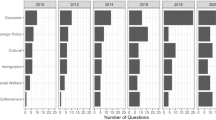Abstract
The cumulative growth of social programs and public income distribution is leading to a grave need for policy harmonization, i.e., efforts to take into account interdependencies across formerly distinct areas of public and private activity. This need is particularly severe with regard to income support programs, labor market relations and taxation systems. While any fundamental backlash against the welfare state is unlikely, so too is any comprehensive solution through negative income taxation or other abstract forms of economic planning. Prospects for coping with problems of policy harmonization differ among nations, but all countries face the challenge of building consensus around noneconomic values lying at the heart of social policy. Without this cushion of legitimacy, increased policy complexity and higher public expectations threaten to overwhelm democratic political systems.
Similar content being viewed by others
Author information
Authors and Affiliations
Additional information
The author wishes to thank Walter Galenson, Ida Merriam, Gosta Rehn and Harold Wilensky for their helpful comments on an earlier draft of this paper. An earlier version of this essay was written for a round table discussion sponsored by the Polish Academy of Sciences.
Rights and permissions
About this article
Cite this article
Heclo, H. Frontiers of social policy in Europe and America. Policy Sci 6, 403–421 (1975). https://doi.org/10.1007/BF00142382
Issue Date:
DOI: https://doi.org/10.1007/BF00142382




